Recent Storm Damage Posts
SERVPRO Storm Team Fleet at FL HQ
7/3/2024 (Permalink)
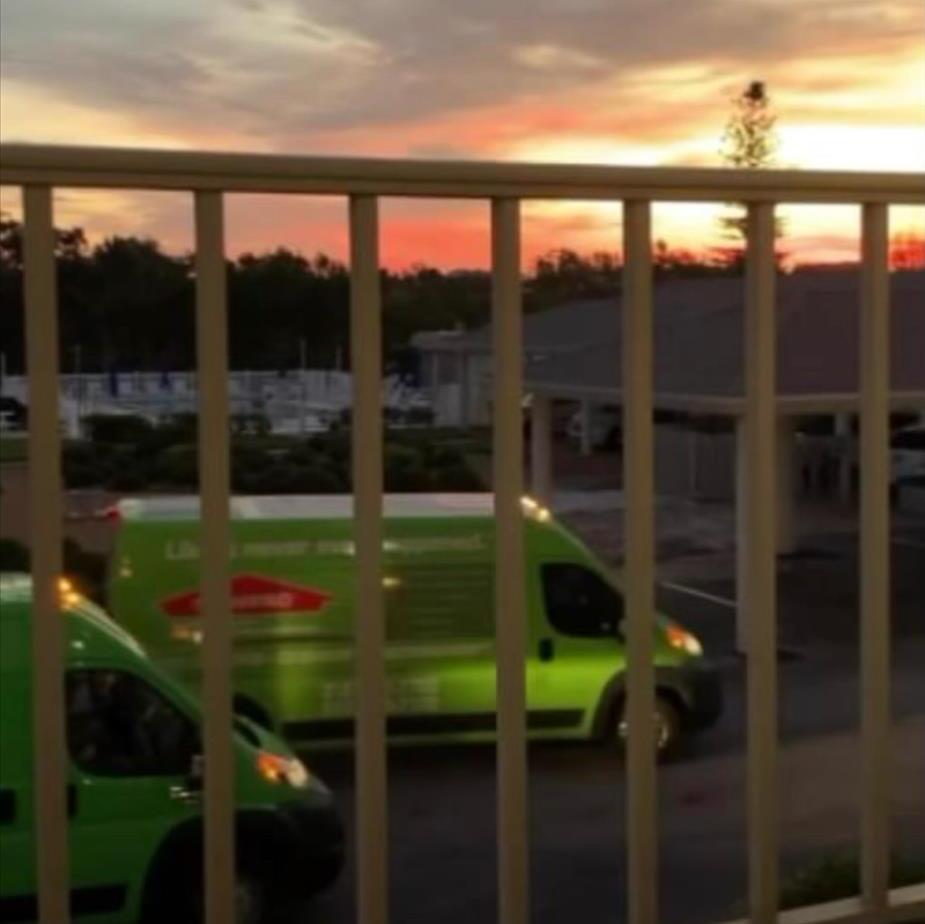 Our fleet team working Hurricane Ian
Our fleet team working Hurricane Ian
Did you know that SERVPRO has a specialized storm team and large loss response network to provide the resources to your property when others can’t?
In the event of a disaster, SERVPRO professionals have the resources to relocate crews with equipment to take care of all of our customer’s needs. SERVPRO strategically places mobilization teams across the country to travel when needed to support in recovery after large storm events such as hurricanes.
Our job as water damage restoration professionals is to limit the amount of business interruption. We understand that fast mitigation is key to getting your business back up and running.
SERVPRO provides the resources in the event of a large storm event to make sure that the right equipment, procedures and training are in place to ensure that the structure is dry the first time and saves you time and money.
Do you have questions about how SERVPRO of Columbus, Jackson & Jennings can help you prepare for a disaster? Contact us today at (812) 372-7760!
Storm Team Season
7/2/2024 (Permalink)
 SERVPRO Storm Team Fleets
SERVPRO Storm Team Fleets
SERVPRO Disaster Recovery Team stationed at our FL office during Hurricane Season.Did you know that SERVPRO has a specialized storm team and large loss response network to provide the resources to your property when others can’t? In the event of a disaster, SERVPRO professionals have the resources to relocate crews with equipment to take care of all of our customer’s needs. SERVPRO strategically places mobilization teams across the country to travel when needed to support in recovery after large storm events such as hurricanes. Our job as water damage restoration professionals is to limit the amount of business interruption. We understand that fast mitigation is key to getting your business back up and running. SERVPRO provides the resources in the event of a large storm event to make sure that the right equipment, procedures and training are in place to ensure that the structure is dry the first time and saves you time and money.
Do you have questions about how SERVPRO of Columbus, Jackson & Jennings Counties can help you prepare for a disaster? Contact us today at 812-372-7760 !!
Storm Team Season
7/2/2024 (Permalink)
SERVPRO Disaster Recovery Team stationed at our FL office during Hurricane Season.Did you know that SERVPRO has a specialized storm team and large loss response network to provide the resources to your property when others can’t? In the event of a disaster, SERVPRO professionals have the resources to relocate crews with equipment to take care of all of our customer’s needs. SERVPRO strategically places mobilization teams across the country to travel when needed to support in recovery after large storm events such as hurricanes. Our job as water damage restoration professionals is to limit the amount of business interruption. We understand that fast mitigation is key to getting your business back up and running. SERVPRO provides the resources in the event of a large storm event to make sure that the right equipment, procedures and training are in place to ensure that the structure is dry the first time and saves you time and money.
Do you have questions about how SERVPRO of Columbus, Jackson & Jennings Counties can help you prepare for a disaster? Contact us today at 812-372-7760 !!
Storm Team Proud
7/2/2024 (Permalink)
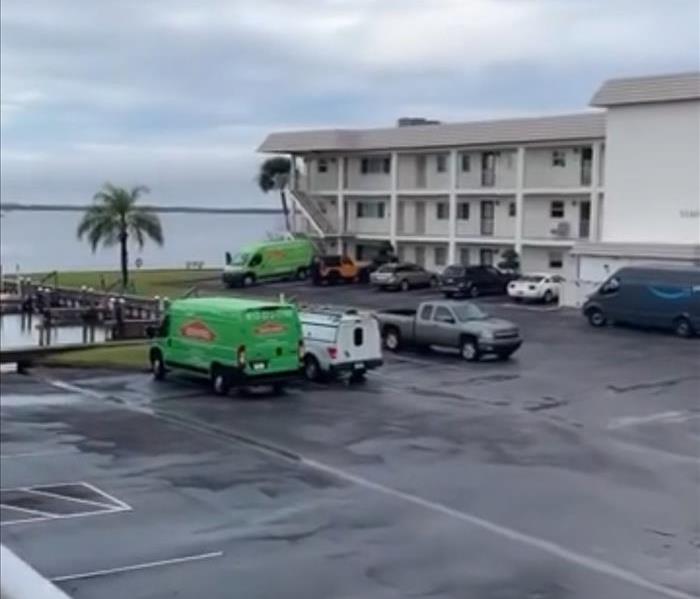 Our storm team fleet positioned at our FL Storm Team HQ
Our storm team fleet positioned at our FL Storm Team HQ
SERVPRO Disaster Recovery Team stationed at our office during Hurricane Harvey.Did you know that SERVPRO has a specialized storm team and large loss response network to provide the resources to your property when others can’t? In the event of a disaster, SERVPRO professionals have the resources to relocate crews with equipment to take care of all of our customer’s needs. SERVPRO strategically places mobilization teams across the country to travel when needed to support in recovery after large storm events such as hurricanes. Our job as water damage restoration professionals is to limit the amount of business interruption. We understand that fast mitigation is key to getting your business back up and running. SERVPRO provides the resources in the event of a large storm event to make sure that the right equipment, procedures and training are in place to ensure that the structure is dry the first time and saves you time and money.
Do you have questions about how SERVPRO of Beaumont can help you prepare for a disaster? Contact us today at (812) 372-7760!!
Storm Team Proud
7/2/2024 (Permalink)
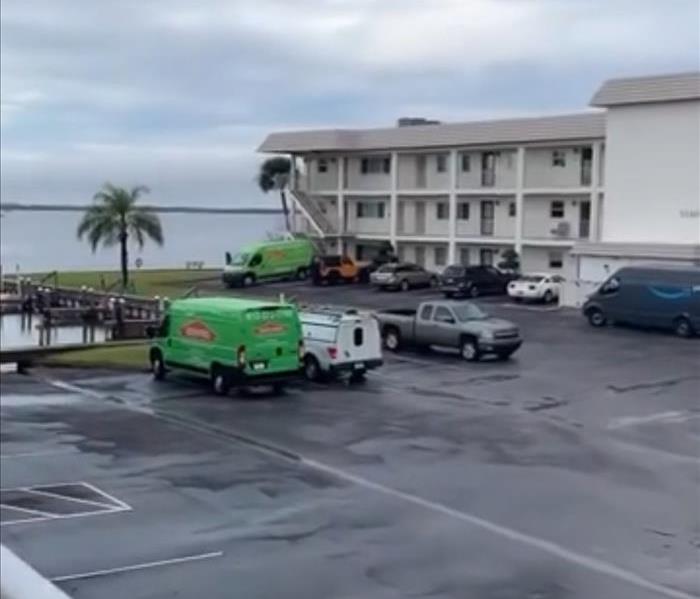 Our storm team fleet positioned at our FL Storm Team HQ
Our storm team fleet positioned at our FL Storm Team HQ
SERVPRO Disaster Recovery Team stationed at our office during Hurricane Harvey.Did you know that SERVPRO has a specialized storm team and large loss response network to provide the resources to your property when others can’t? In the event of a disaster, SERVPRO professionals have the resources to relocate crews with equipment to take care of all of our customer’s needs. SERVPRO strategically places mobilization teams across the country to travel when needed to support in recovery after large storm events such as hurricanes. Our job as water damage restoration professionals is to limit the amount of business interruption. We understand that fast mitigation is key to getting your business back up and running. SERVPRO provides the resources in the event of a large storm event to make sure that the right equipment, procedures and training are in place to ensure that the structure is dry the first time and saves you time and money.
Do you have questions about how SERVPRO of Beaumont can help you prepare for a disaster? Contact us today at (812) 372-7760!!
Storm Team Season
7/2/2024 (Permalink)
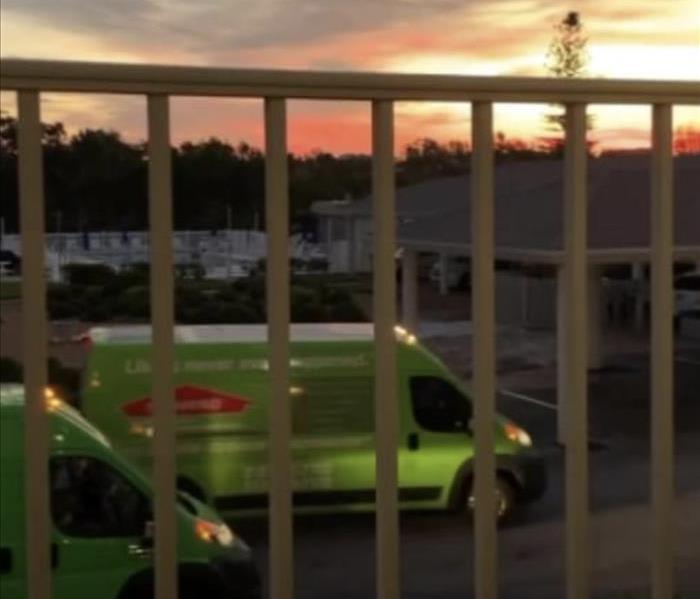 Our storm team fleets heading out after Hurricane’s from our own FL HQ.
Our storm team fleets heading out after Hurricane’s from our own FL HQ.
Did you know that SERVPRO has a specialized storm team and large loss response network to provide the resources to your property when others can’t? In the event of a disaster, SERVPRO professionals have the resources to relocate crews with equipment to take care of all of our customer’s needs. SERVPRO strategically places mobilization teams across the country to travel when needed to support in recovery after large storm events such as hurricanes. Our job as water damage restoration professionals is to limit the amount of business interruption. We understand that fast mitigation is key to getting your business back up and running. SERVPRO provides the resources in the event of a large storm event to make sure that the right equipment, procedures and training are in place to ensure that the structure is dry the first time and saves you time and money.
Do you have questions about how SERVPRO of Beaumont can help you prepare for a disaster? Contact us today at (812) 372-7760!
Storm Team Season
7/2/2024 (Permalink)
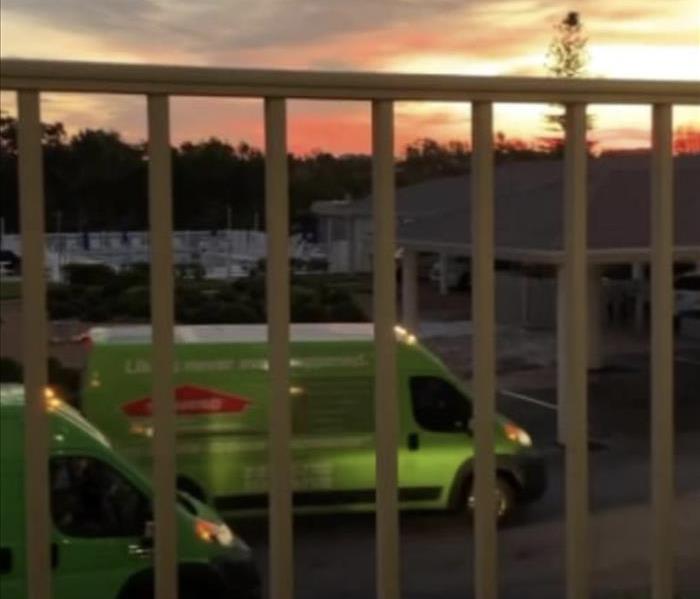 Our storm team fleets heading out after Hurricane’s from our own FL HQ.
Our storm team fleets heading out after Hurricane’s from our own FL HQ.
Did you know that SERVPRO has a specialized storm team and large loss response network to provide the resources to your property when others can’t? In the event of a disaster, SERVPRO professionals have the resources to relocate crews with equipment to take care of all of our customer’s needs. SERVPRO strategically places mobilization teams across the country to travel when needed to support in recovery after large storm events such as hurricanes. Our job as water damage restoration professionals is to limit the amount of business interruption. We understand that fast mitigation is key to getting your business back up and running. SERVPRO provides the resources in the event of a large storm event to make sure that the right equipment, procedures and training are in place to ensure that the structure is dry the first time and saves you time and money.
Do you have questions about how SERVPRO of Beaumont can help you prepare for a disaster? Contact us today at (812) 372-7760!
Storm Team Season
7/2/2024 (Permalink)
 Our storm team fleets heading out after Hurricane’s from our own FL HQ.
Our storm team fleets heading out after Hurricane’s from our own FL HQ.
Did you know that SERVPRO has a specialized storm team and large loss response network to provide the resources to your property when others can’t? In the event of a disaster, SERVPRO professionals have the resources to relocate crews with equipment to take care of all of our customer’s needs. SERVPRO strategically places mobilization teams across the country to travel when needed to support in recovery after large storm events such as hurricanes. Our job as water damage restoration professionals is to limit the amount of business interruption. We understand that fast mitigation is key to getting your business back up and running. SERVPRO provides the resources in the event of a large storm event to make sure that the right equipment, procedures and training are in place to ensure that the structure is dry the first time and saves you time and money.
Do you have questions about how SERVPRO of Beaumont can help you prepare for a disaster? Contact us today at (812) 372-7760!
Storm Team Season
7/2/2024 (Permalink)
 Our storm team fleets heading out after Hurricane’s from our own FL HQ.
Our storm team fleets heading out after Hurricane’s from our own FL HQ.
Did you know that SERVPRO has a specialized storm team and large loss response network to provide the resources to your property when others can’t? In the event of a disaster, SERVPRO professionals have the resources to relocate crews with equipment to take care of all of our customer’s needs. SERVPRO strategically places mobilization teams across the country to travel when needed to support in recovery after large storm events such as hurricanes. Our job as water damage restoration professionals is to limit the amount of business interruption. We understand that fast mitigation is key to getting your business back up and running. SERVPRO provides the resources in the event of a large storm event to make sure that the right equipment, procedures and training are in place to ensure that the structure is dry the first time and saves you time and money.
Do you have questions about how SERVPRO of Beaumont can help you prepare for a disaster? Contact us today at (812) 372-7760!
Storm Team Season
7/2/2024 (Permalink)
 Our storm team fleets heading out after Hurricane’s from our own FL HQ.
Our storm team fleets heading out after Hurricane’s from our own FL HQ.
Did you know that SERVPRO has a specialized storm team and large loss response network to provide the resources to your property when others can’t? In the event of a disaster, SERVPRO professionals have the resources to relocate crews with equipment to take care of all of our customer’s needs. SERVPRO strategically places mobilization teams across the country to travel when needed to support in recovery after large storm events such as hurricanes. Our job as water damage restoration professionals is to limit the amount of business interruption. We understand that fast mitigation is key to getting your business back up and running. SERVPRO provides the resources in the event of a large storm event to make sure that the right equipment, procedures and training are in place to ensure that the structure is dry the first time and saves you time and money.
Do you have questions about how SERVPRO of Beaumont can help you prepare for a disaster? Contact us today at (812) 372-7760!
Storm Team Season
7/2/2024 (Permalink)
 Our storm team fleets heading out after Hurricane’s from our own FL HQ.
Our storm team fleets heading out after Hurricane’s from our own FL HQ.
Did you know that SERVPRO has a specialized storm team and large loss response network to provide the resources to your property when others can’t? In the event of a disaster, SERVPRO professionals have the resources to relocate crews with equipment to take care of all of our customer’s needs. SERVPRO strategically places mobilization teams across the country to travel when needed to support in recovery after large storm events such as hurricanes. Our job as water damage restoration professionals is to limit the amount of business interruption. We understand that fast mitigation is key to getting your business back up and running. SERVPRO provides the resources in the event of a large storm event to make sure that the right equipment, procedures and training are in place to ensure that the structure is dry the first time and saves you time and money.
Do you have questions about how SERVPRO of Beaumont can help you prepare for a disaster? Contact us today at (812) 372-7760!
Nobody wants to go in their crawlspace, but here is why you should!
7/3/2023 (Permalink)
In years past, record rainfall has created problems for homeowners in the Columbus, Indiana area.
We experienced flooding this past year, and can expect snow and melt-water runoff to head down the mountains and into the valley when this winter thaws.
- Water has found its way into the crawlspaces of many area homes. SERVPRO® technicians have responded to a large number of requests for services to dry out flooded crawlspaces.
- Even if you have not experienced flooding in your crawlspace in the past, it is always a good idea to do periodic inspections, especially after heavy rains, to ensure the safety of your home.
- Water intrusions in your crawlspace, left untreated, can cause structural damage and allow mold to grow in your home.
SERVPRO technicians have the equipment and experience to take care of any water damage to your home, making it, “Like it never even happened.”
So Many Details With Storms: Is your storm damage tax deductible?
2/19/2023 (Permalink)
If your commercial property has been damaged by a storm, you may want to know whether the cost of the damage is tax-deductible. Unrecoverable losses caused by storms or natural disasters are usually deductible, as long as these damages are proven and will not be reimbursed by insurance. Here are three steps you can take to find out whether you can deduct the cost of storm damage from your tax bill.
3 Steps to Find Out if Storm Damage is Tax Deductible.
- Determine how much damage your insurance covers. If your business is insured, you can only deduct damage that exceeds your coverage or was not covered for other reasons. Owners of uninsured commercial property can deduct the total cost of storm damage. Consult IRS Publication 547, Casualties, Disasters, and Thefts, to read the rules for claiming these deductions.
- Check to see if a storm or disaster is a Presidential Declared Disaster. If you are dealing with storm damage in a region that has been federally recognized as a disaster area, special filing options may apply to your situation. Check the IRS's list of tax relief in disaster situations to see if your locality is listed and find out about any assistance that is available.
- Distinguish between actual property loss and deductible property loss. Actual property loss is your total loss as the owner of a commercial property. Deductible property loss is based on the current value of your property and factors in all reductions. If you are unsure about reductions involved in a commercial property, you should contact an accountant.
If you have unrecoverable storm damage at your commercial property, you should see if you can deduct any damage from your tax bill. Tax deductions cannot overlap with covered losses, but these deductions can help to offset the cost of professional damage restoration if your property is uninsured or underinsured.
When Sever Storms Bring Damages - Count On SERVPRO To Help!
7/1/2022 (Permalink)
SERVPRO Tips: How To Avert Storm Damage To Your Business
Storm DamageApproved 5/25/2021
How to Prevent Storm Damage to Your Business
When a storm affects a business, business owners may wonder what they could have done to prevent the damage. Performing exterior maintenance and inspecting your property prior to a storm, however, may make it easier to prevent storm damage.
1. Obvious Signs of Damage
When inspecting a building, there are certain issues that may be quite obvious. For example, mold growth on a building can be highly visible, and damaged siding can also be easy to spot. Visible signs of exterior damage may also be an indicator that your building has sustained interior damage, and it is sometimes useful to employ water and mold restoration professionals if you suspect your business has existing damage that could become worse if a storm occurs.
2. Loose, Cracked or Worn-Down Materials
Thoroughly examining building materials and areas that are prone to damage before a storm can also be helpful. If you know there are building materials, such as old roof shingles, that may be prone to damage, it can be helpful to check that the materials aren’t loose, dented or otherwise damaged before a storm. Perform frequent exterior maintenance in these areas can help to keep your building maintained.
3. Potential Sources of Damage
When inspecting the exterior of your business, it may be easy to forget to examine your environment. However, even you don’t see any visible indications of a problem and you don’t notice any worn-down materials, it can be important to look around your property for debris or other materials that could damage your business during a storm. You can also use landscaping to your advantage by planting shrubs, flowers or trees that are able to absorb excess water, which may be able to prevent floodwater from affecting your building.
By performing exterior maintenance before a storm can prevent your building from sustaining damage. In your building inspection, it can be helpful to look for obvious signs of damage, worn-down materials and potential sources that could cause damage to your property during a storm.
Give us a call if a storm does hit your business! We are faster to any disaster and are ready to put our expertise, equipment and experience to work for you!
Are You Ready For Sever Storms?
6/30/2022 (Permalink)
Storms can bring severe damage from a variety of things. We are faster to all forms of disaster and are here to help you!
- Storms deposit a large amount of rain, which, if your home isn't prepared for, can cause serious flooding.
- If your home does flood, or after the storm has passed begins to smell musty, mold may have grown because of the moisture.
- Lightning can strike a home or yard and cause heat damage, or even start a fire.
- Winds can break off chunks of housing, roof-tiles, hurl debris around, and shatter windows.
SERVPRO specializes in remediating storm-battered and damaged properties. We know that while the storm is happening, it seems like all you can do is rely on the preparation you've done, and stay as safe as possible. Focus on those crucial things, and when it's all over, let SERVPRO help you put your property back "Like it never even happened."
SERVPRO of Columbus & Storm Restoration - Go Hand In Hand
5/25/2022 (Permalink)
Indiana weather can sometimes be unpredictable. Weather in our community can range from a sunny day to a downpour with heavy winds, to freezing weather and heavy snowfall. You can go from wearing shorts to putting on a coat. Since our weather can be unpredictable, it’s important to know what damages severe weather can cause to stay prepared.
What is a thunderstorm?
A thunderstorm is a storm in which you hear lightning. But what is the scientific definition of a thunderstorm? For a thunderstorm to be considered a “thunderstorm” there are three basic things required:
- Moisture
- Rising unstable air
- Lifting mechanism
If you see a thunderstorm approaching, you should immediately seek shelter.
What kind of damage can a thunderstorm cause?
A thunderstorm can cause a lot of damage to communities. Heavy rain, flooding, hail, strong wind gusts and lightening are all potential dangers of a thunderstorm. Rainfall from thunderstorms can cause flash flooding. Flooding can be a hazard to basements if the sump pump suddenly stops working or can’t keep up with the amount of water, thereby flooding a basement. Depending on its size, hail can cause damage to vehicles, homes and even injure animals. Strong wind gusts can blow debris, topple trees and heavy objects around causing damage to homes and businesses.
SERVPRO of Columbus offers storm restoration
SERVPRO of Columbus offers storm restoration for your home or business. We are faster to any disaster since we are local and open 24/7/365. You can trust the SERVPRO of Columbus team to clean up any storm damage in your home or business and make it look “Like it never even happened.”
It Is Important To Stay Safe After A Flood
3/31/2022 (Permalink)
There are many risks associated with flooding. One of them is the danger associated with your electrical system. It is critically important to treat all electrical appliances, equipment and outlets with caution. Here are a few safety tips:
- Never step into standing water that has covered electrical outlets or devices-the water could already be charged with electric current.
- If there are downed power lines in your area, you should avoid them and notify your local power company.
- Avoid areas where there are sparks or if you hear popping or buzzing noises.
- If you smell something that resembles plastic burning, this could indicate an electrical fire.
After any flooding event, you should consult a certified electrician to determine the extent of damage to your electrical system.
It Is Important To Stay Safe After A Flood
3/31/2022 (Permalink)
There are many risks associated with flooding. One of them is the danger associated with your electrical system. It is critically important to treat all electrical appliances, equipment and outlets with caution. Here are a few safety tips:
- Never step into standing water that has covered electrical outlets or devices-the water could already be charged with electric current.
- If there are downed power lines in your area, you should avoid them and notify your local power company.
- Avoid areas where there are sparks or if you hear popping or buzzing noises.
- If you smell something that resembles plastic burning, this could indicate an electrical fire.
After any flooding event, you should consult a certified electrician to determine the extent of damage to your electrical system.
Winter Storms Aren't The Only Danger To Look Out For - Ice Dams
2/7/2022 (Permalink)
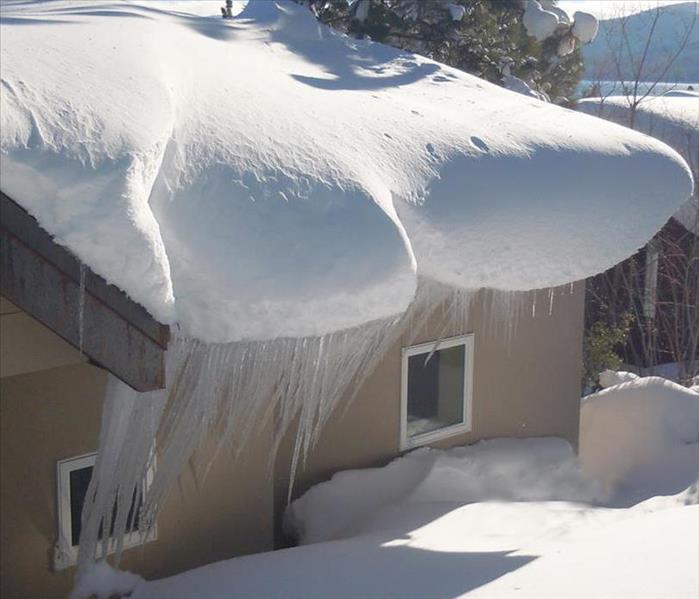 When snow falls, melts, and then freezes quickly, it can wreak havoc on your roof and eventually in your home!
When snow falls, melts, and then freezes quickly, it can wreak havoc on your roof and eventually in your home!
The Much Dreaded Ice Dam
When you live in the Columbus, Indiana area for any length of time, you get very used to the "temp roller coaster" that is our climate. It can be cold, warm, and ridiculously cold...sometimes in the same exact day! Luckily most people are used to this and to the hazards that can develop as a result. One such hazard is the ice dam.
When snow falls, melts, and then freezes quickly, it can wreak havoc on your roof and eventually in your home!
Check out this scholarly article on the ins and outs of ice dams, and then give us a call if this, or any other disaster strikes your home or business!
https://jsheld.com/university/articles/ice-dams-formations-and-fixes




 24/7 Emergency Service
24/7 Emergency Service










